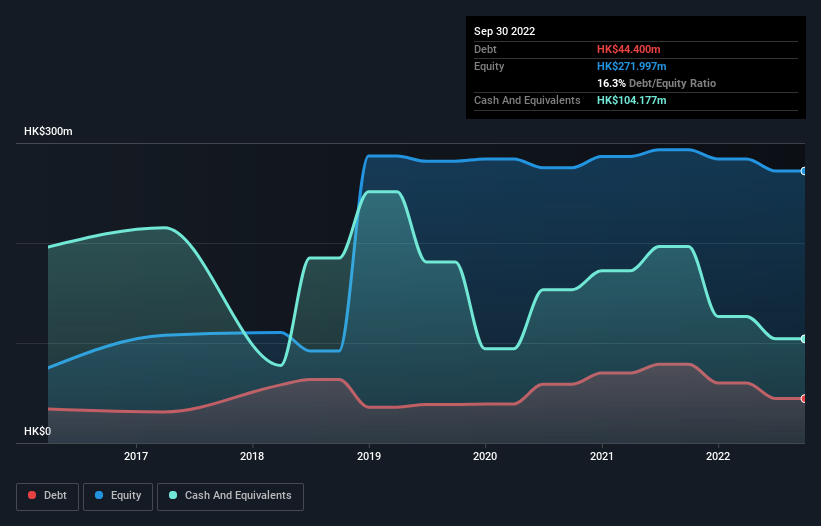- Hong Kong
- /
- Consumer Services
- /
- SEHK:1939
Here's Why Tokyo Chuo Auction Holdings (HKG:1939) Can Manage Its Debt Responsibly

Legendary fund manager Li Lu (who Charlie Munger backed) once said, 'The biggest investment risk is not the volatility of prices, but whether you will suffer a permanent loss of capital.' So it seems the smart money knows that debt - which is usually involved in bankruptcies - is a very important factor, when you assess how risky a company is. We can see that Tokyo Chuo Auction Holdings Limited (HKG:1939) does use debt in its business. But the real question is whether this debt is making the company risky.
Why Does Debt Bring Risk?
Generally speaking, debt only becomes a real problem when a company can't easily pay it off, either by raising capital or with its own cash flow. If things get really bad, the lenders can take control of the business. While that is not too common, we often do see indebted companies permanently diluting shareholders because lenders force them to raise capital at a distressed price. Of course, plenty of companies use debt to fund growth, without any negative consequences. When we examine debt levels, we first consider both cash and debt levels, together.
View our latest analysis for Tokyo Chuo Auction Holdings
How Much Debt Does Tokyo Chuo Auction Holdings Carry?
The image below, which you can click on for greater detail, shows that Tokyo Chuo Auction Holdings had debt of HK$44.4m at the end of September 2022, a reduction from HK$78.7m over a year. But it also has HK$104.2m in cash to offset that, meaning it has HK$59.8m net cash.

How Strong Is Tokyo Chuo Auction Holdings' Balance Sheet?
The latest balance sheet data shows that Tokyo Chuo Auction Holdings had liabilities of HK$222.7m due within a year, and liabilities of HK$33.9m falling due after that. Offsetting these obligations, it had cash of HK$104.2m as well as receivables valued at HK$251.0m due within 12 months. So it actually has HK$98.5m more liquid assets than total liabilities.
It's good to see that Tokyo Chuo Auction Holdings has plenty of liquidity on its balance sheet, suggesting conservative management of liabilities. Because it has plenty of assets, it is unlikely to have trouble with its lenders. Simply put, the fact that Tokyo Chuo Auction Holdings has more cash than debt is arguably a good indication that it can manage its debt safely.
Shareholders should be aware that Tokyo Chuo Auction Holdings's EBIT was down 75% last year. If that decline continues then paying off debt will be harder than selling foie gras at a vegan convention. The balance sheet is clearly the area to focus on when you are analysing debt. But you can't view debt in total isolation; since Tokyo Chuo Auction Holdings will need earnings to service that debt. So when considering debt, it's definitely worth looking at the earnings trend. Click here for an interactive snapshot.
But our final consideration is also important, because a company cannot pay debt with paper profits; it needs cold hard cash. Tokyo Chuo Auction Holdings may have net cash on the balance sheet, but it is still interesting to look at how well the business converts its earnings before interest and tax (EBIT) to free cash flow, because that will influence both its need for, and its capacity to manage debt. Considering the last two years, Tokyo Chuo Auction Holdings actually recorded a cash outflow, overall. Debt is far more risky for companies with unreliable free cash flow, so shareholders should be hoping that the past expenditure will produce free cash flow in the future.
Summing Up
While it is always sensible to investigate a company's debt, in this case Tokyo Chuo Auction Holdings has HK$59.8m in net cash and a decent-looking balance sheet. So we don't have any problem with Tokyo Chuo Auction Holdings's use of debt. When analysing debt levels, the balance sheet is the obvious place to start. However, not all investment risk resides within the balance sheet - far from it. For example Tokyo Chuo Auction Holdings has 4 warning signs (and 2 which make us uncomfortable) we think you should know about.
At the end of the day, it's often better to focus on companies that are free from net debt. You can access our special list of such companies (all with a track record of profit growth). It's free.
Valuation is complex, but we're here to simplify it.
Discover if Tokyo Chuo Auction Holdings might be undervalued or overvalued with our detailed analysis, featuring fair value estimates, potential risks, dividends, insider trades, and its financial condition.
Access Free AnalysisHave feedback on this article? Concerned about the content? Get in touch with us directly. Alternatively, email editorial-team (at) simplywallst.com.
This article by Simply Wall St is general in nature. We provide commentary based on historical data and analyst forecasts only using an unbiased methodology and our articles are not intended to be financial advice. It does not constitute a recommendation to buy or sell any stock, and does not take account of your objectives, or your financial situation. We aim to bring you long-term focused analysis driven by fundamental data. Note that our analysis may not factor in the latest price-sensitive company announcements or qualitative material. Simply Wall St has no position in any stocks mentioned.
About SEHK:1939
Tokyo Chuo Auction Holdings
An investment holding company, provides auction, artwork sales, and related services in Hong Kong and Japan.
Mediocre balance sheet very low.

